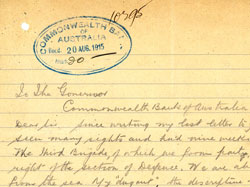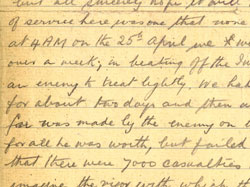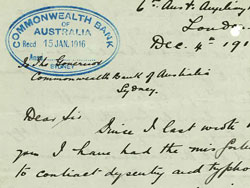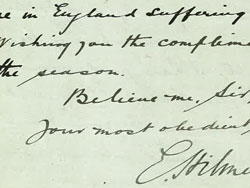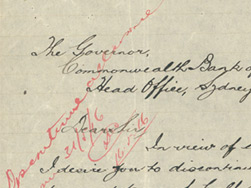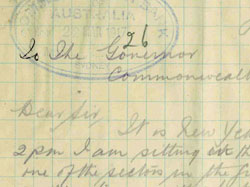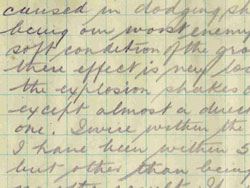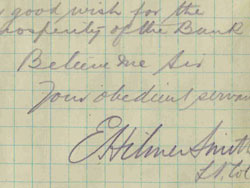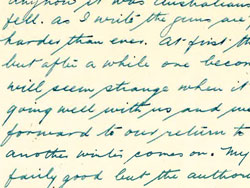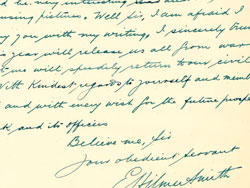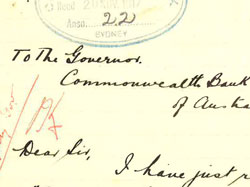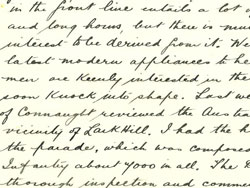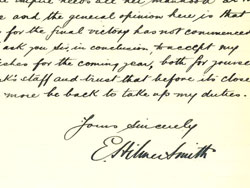From Bank to Battlefield
Letters from the Front
Dear Governor...
The Bank's first Governor, Sir Denison Miller, had a special relationship with staff serving during the war. Working relationships were close and there were shared beliefs about the important role the Bank would come to play. Even from the battlefields, staff were keen to hear of the progress of the Bank. And they shared significant experiences with the Governor.
Browse and read some of the letters.
Letter from Ernest Hilmer Smith to Governor Denison Miller – Gallipoli Peninsula, 27 June 1915
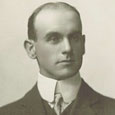
Anzac
Gallipoli Pen (Peninsula)
near Gaba Tepe
27/6/15
To the Governor
Commonwealth Bank of Australia – Sydney
Dear Sir, since writing my last letter to you I have seen many sights and had nine weeks of fighting – The Third Brigade, of which we form part, are on the right of the section of Defence. We are about 600yds in from the sea. My “dugout”, the descriptive name given to our living places, is situated at about an altitude of 300ft above sea level, and looks out immediately on the Islands of Imbros and Samothrace.
Our conditions are hardly what can be described as pleasant but everybody is wonderfully cheerful and the health generally is good. We have been in the firing line now for nine weeks continuously and have done a tremendous lot of digging in addition to fighting.
The hills we occupy are just a maze of underground tunnels and fire pits. I have rather lost touch with the members of the Bank staff whom I met in Egypt. Brooke of the Hobart Branch was wounded on the first day. I have not yet heard how he is progressing. Chambers also of the Hobart Branch joined the 12th Bn recently. Since the 25th April I have been in command of the 12th Bn and have been promoted to the Rank of Lieut. Colonel.
I find Sir that the worries of a Battalion on active service are even more than those of managing a Savings Bank. Our Battalion however is doing very well and we are all looking forward to the day when we will advance. We are continuously under shell fire. It’s a grand sight to see a bombardment. Recently the HMS … came close into shore and heavily bombarded the Turkish fortifications. Watching the effect of the shells from our lines was awe inspiring. The whole of the position shelled was one mass of fire. It’s hard to imagine how anyone could live through it. Yet on the first day we had a similar experience for eight hours and although we suffered very heavily a good % of us escaped, how it was I do not know.
Personally I had some miraculous escapes. My clothing & equipment was perforated in no less than six places. One learns rapidly however, the art of this warfare and does not waste much time in not taking precautions. The main thing is to get underground if you want to live.
There are very many items of interest I would like to describe to you but unfortunately censorship has not yet been raised. We hear very little news about the war and have to be content by reading news some weeks old. I hear occasionally from Mr Douglas & other members of the Staff and am pleased to know that the Bank is still making good progress. We are unable to state yet the probable date of our return but all sincerely hope it will be before Xmas.
Our first week of service here was one that none of us are likely to forget. Landing at 4 am on the 25th April we were kept exceedingly busy for over a week, in beating off the Turks, who are by no means an enemy to treat lightly. We had a slight cessation of hostilities for about two days and then at it again. The final effort so far was made by the enemy on the 18th/19th May when he fought for all he was worth, but failed to dislodge us.
It is estimated that there were 7000 casualties in these two days, so you can imagine the vigor with which the attack was made. We were fortunate in having a good strong position and our Machine Guns & Rifles did great damage, in 250 yds we buried over 200 Turks, and got many wounded into our lines. My Hd Qtrs after the battle more resembled an auction room than anything else. We had articles of equipment, rifles, Coppers, tents, belts, crockery, trinkets and all sorts of articles which were collected at night-time from the valley on our front.
I have no more paper with which to continue so will postpone giving further news till more paper arrives. Wishing yourself and members of the Staff all happiness & prosperity – Believe me – Sir – Sincerely yours, E. Hilmer Smith Lt. Col. of 12th Bn.
Letter from Ernest Hilmer Smith to Governor Denison Miller – 6th Australian Auxiliary Hospital, London, England, 4 December 1915

6th Aust. Auxiliary Hospital
London.
Dec 4th 1915.
To the Governor
Commonwealth Bank of Australia – Sydney
Dear Sir
Since I last wrote to you I have had the misfortune to contract dysentery and typhoid and am now convalescing in England. I have just received your letter of the 23rd August and thank you for your kind expressions and interest you take in my welfare.
The King has been pleased to confer on me the decoration of CB and I feel sure that you will be pleased to know that such distinctions are being bestowed on members of your staff.
I am looking forward to the time when I can once more take up my duties in the service of the Bank. I have already met Mr Campion who has been extremely kind to me. He gave me a copy of the annual report of the Bank and I was much interested to see the splendid increases in Savings Bank Deposits.
As soon as I am strong enough I intend to spend some time in the offices as the experience will be useful in days to come. I have met several of the financial men here and have been shown over the Bank of England and other institutions of interest. The business of London seems to be going on much as usual but the hours of business have been curtailed. After 5pm London is wrapped in darkness, and it is exceedingly difficult to find your way about. I find the best thing to do is to stay at home as much as you can.
After I am out of the Doctors hands I hope to go out in the country for a couple of weeks and should then be fit to join my Regiment once more. The 3rd Infantry Bgde has suffered rather heavily from the five months fighting. The Brigadiers, Brigade Major and all the Battalion Commanders are in England suffering a recovery.
Wishing you the compliments of the season.
Believe me, Sir,
Your most obedient servant
E Hilmer Smith
Letter from Ernest Hilmer Smith to Governor Denison Miller – near Adelaide while onboard the P&O ship the S.S. Malwa, 29 February 1916

near Adelaide
P&O. S.N.Co.
S.S. “Malwa”
February 29th 1916.
To The Governor
Commonwealth Bank of Australia, Sydney
Dear Sir,
On the 18th January I received orders from the Defence Dept. in London, to report to Headquarters in Melbourne at once, as I was not likely to be fit for active service for some weeks. I took passage by the “Malwa” and arrive in Melbourne on Friday 3rd March. I have not yet been informed what duty I am to be given, but I will advise you of my whereabouts as soon as I receive my orders. In the meantime should you desire to communicate with me my address will be care of the Bank at Hobart.
I am, Sir,
Your obedient servant
E Hilmer Smith.
Letter from Robert Sabeston to Governor Denison Miller – Cairo, Egypt, 16 March 1916
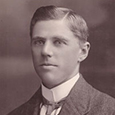
A.I.F Headquarters
Cairo, Egypt
16.3.16
The Governor,
Commonwealth Bank of a/a
Head Office,
Sydney
Dear Sir
In view of existing conditions I desire you to discontinue, as from 31/5/1916, the payment to me of half salary. By that time I shall have completed 12 months service with the A.I.F. The present campaign does not yet appear to be nearing the end but I trust hostilities will terminate at an early date and that I shall soon be in a position to resume my service with the Bank.
I do not desire to prejudice, in any way, the rights or privileges of others who may be differently circumstanced to myself, but trust you will be able to gratify a personal wish by acceding to this request.
Yours faithfully,
R. Sabeston
Staff Sergeant
Austn Army Pay Corps
Letter from Ernest Hilmer Smith to
Governor Denison Miller – France,
1 January 1917

In France
Jany (January) 1st 1917
To the Governor
Commonwealth Bank of Australia – Sydney
Dear Sir
It is New Years day about 2 pm. I am sitting in the Hd Qtrs of one of the sections in the front line and writing to you with what little light I can obtain from a small piece of candle.
The dugouts in which we live while doing our tour of duty at the front are really underground houses. This one is 30ft underground, my own room measures 12ft by 12ft and there are many similar rooms for Hd Qtrs Staff. All day long the shells pound away on top but with the exception of occasional showers of earth on our heads nothing much else happens. Of course we do not spend all our time underground, most of it is spent around the lines but it is very restful to climb down here after your tour is finished.
The country in which we are located is laid waste by war. Not a village or a tree remains standing and the ground is one mass of holes caused by H.E. shells for miles and miles. These holes are really dangerous especially if one is out in the dark as being full of slimy mud to often a depth of 6ft it is a difficult matter to get out after once getting in. Good fortune and Providence have so far watched over me and I have escaped other than slight injuries.
The conditions of living here are extremely hard but better than Gallipoli. The worst thing we have to contend with is mud. This is literally over our knees in most places and one wants to be in the pink of condition to travel far in it. The organisation is splendid and everything works well but the life is too strenuous for a man to hope to last very long at it.
I am afraid that I cannot write a very interesting letter from here Sir, as everything I want to say is ‘forbidden by Censor’. The life is full of excitement and interest, the excitement is chiefly caused in dodging shells. The 12 inch H.E. being our worst enemy. Owing to the soft condition of the ground however their effect is very local and although the explosion shakes ones nerves nothing except almost a direct hit will damage one. Twice within the last few days I have been within 5 yds of such hits but other than being mud splashed no other result.
The weather conditions are trying, rain frost & snow prevail but our fellows are standing it remarkably well. It is astonishing what men will go through and yet remain cheerful. We have now been for 5 weeks without our clothes off once but beyond rather a tired look on their faces the men are as full of spirit as ever.
I arrived in France on the 14th October and to date have spent 52 days in the forward area so that it’s only natural one should feel a bit tired. We are looking forward to a spell shortly and then intend to celebrate our Xmas and New Year.
May I take this opportunity, Sir, of wishing yourself and the Bank's Staff a prosperous and Happy New Year and of expressing the wish that before another one goes round we will all be back at our civil duties once more.
I am now commanding a Western Australian Battalion in my old Brigade but hope before long to receive promotion as I am next on the list. I have not met any other members of the Staff while in France. There are so many troops here and we are continually on the move so that we do not see each other as we did on Gallipoli.
I trust however that the honour roll of the Bank is still progressing and that on the conclusion of the war we will compare more than favourably with the other large institutions of Australia.
With every good wish for the future prosperity of the Bank.
Believe me Sir
Your obedient servant
E Hilmer Smith Lt. Col.
Letter from Ernest Hilmer Smith to Governor Denison Miller – France, 26 April 1917

In France
26th April 1917
To Denison Miller Esq.
Governor
Commonwealth Bank of Australia – Sydney
Dear Sir
My last letter to you was written early in January. At that time we were suffering the hardships of a winter campaign, one of the severest winters France has known. Now the spring is well advanced and the whole country has taken on quite a different aspect. The trees are breaking with leaf, the sun shines occasionally and has a little warmth in it and the fields are all green.
Weather plays a big part in war especially on the spirit of the troops and even more so on our men than those of the British & French troops. Our fellows are now full of spirit and the recent actions have shown what splendid material we have still.
Since my last letter I have had many exciting experiences the last resulting in the capture by my Battalion of three villages in 24 hours. This action opened the road to the capture of the big town you will have seen taken by our fellows recently. It was a pity we could not go on as we were within one mile of it and it would have been a great honour to be the first to enter a place which has been our goal for many months. Anyhow it was Australians to whom the honour fell.
As I write the guns are pounding away harder than ever. At first the noise is unbearable but after a while one becomes used to it, but it will seem strange when it ceases.
Everything is going well with us and we are all looking forward to our return to Australia before another winter comes on. My health is still fairly good but the authorities have decided to withdraw me from the front line for a little while, and I leave shortly to take up my new position. I have been appointed to the position of Administrative Commandant of the Army Corps School. It will hardly be a rest as it is a new position and will mean very heavy organising work for a while. It will be interesting work because I will be in close touch with every branch of the Australian Army in the field and the experience will undoubtedly be a valuable one, and I will not be very many miles from the front line.
Last week we had some rather severe fighting as the German is now attacking with a fury that beggars description. I should have said counter attacking because it is not till after we have attacked that he comes at us. Our fellows pluck and dash is splendid and they beat him every time.
The devastation wrought in this sector is awful. What was once a beautiful country dotted with pretty villages and woods with here and there a stately chateau is now a barren waste. One must see it to realize the cruelty of it all. We only trust that the day will come when France and her people will be able to obtain redress.
We only see and hear a little of what is going on but it is quite enough to make any man’s blood boil. We see hundreds of them brought in as prisoners, and of course have to treat them as human beings but personally I would rather interview and examine 50 Turks than one German.
One sees some amusing sights in connection with the escorting of prisoners. Quite recently, some were taken from a well known Prussian Regiment: they were huge men and two of them were sent to my Hd Qtrs under escort of a Corporal about 5.6” in his boots. It was very muddy and therefore difficult walking. I happened to be coming along and met him on his way down. To my surprise I found him mounted on one man's back, smoking a cigarette while the other was marching in front. The sight was one worthy of production in our home papers. If we could only transmit some of the things we see they would be very interesting and in some cases amusing pictures.
Well Sir, I am afraid I will weary you with my writing. I sincerely trust that this year will release us all from war and that we will speedily return to our civil duties.
With kindest regards to yourself and members of the Staff and with every wish for the future prosperity of the Bank and its officers.
Believe me, Sir
Your obedient servant
E. Hilmer Smith
Letter from Ernest Hilmer Smith to Governor Denison Miller – Salisbury Plains, England, 16 September 1917

Hd Qtrs No 1 Group
Larkhill
Salisbury Plains
Sept. 16th 1917
To The Governor
Commonwealth Bank of Australia
Dear Sir
I have just received your letter of the 26th June and thank you for the kind wishes expressed therein. Since I wrote last I have received further advancement and am now in command of the training Brigade of the 1st Australian Division.
All the reinforcements from Australia for the Division pass through this training centre and the number varies according to the supply coming forward from Australia. This is the largest, or at least one of the largest training centres in England. For miles around one passes through nothing but rows of huts about 60ft long to 20ft wide. The camps are all models of cleanliness and the men’s comfort is catered for to the utmost.
We are now entering upon another winter, but although we recognise there are many hardships to face even here the experience gained in the past years will stand us in good stead and we are looking forward to getting through it with a minimum amount of sickness. The process of turning out a soldier fit to take his place in the front line entails a lot of hard work and long hours, but there is much pleasure and interest to be derived from it. We have all the latest modern appliances to help us and our men are keenly interested in their work and very soon Knock into shape.
Last week H.R.H The Duke of Connaught reviewed the Australian troops in the vicinity of Lark Hill. I had the honour to command the parade, which was composed of Artillery and Infantry about 7,000 in all. The Duke made a very thorough inspection and commented very favourably on the physique & Soldierly bearing of the troops. He questioned several men as to what state they came from and some of the answers were very amusing and rather puzzled the Duke. One man said ‘Bunbury’ another said he didn’t come from any state as he was a ‘Drover’.
We continually receive visits from well known British Generals. Recently Sir Evelyn Wood, the first V.C. paid us a visit. He is 80 years of age but still smart and keen. Yesterday Mr Wade inspected the men at work and some few weeks ago Mr Holman addressed the troops.
I am now completely restored to health after the last winter campaign and feel fit to go through the coming one. I hope before long to be back in France as if we have to stay here till the war finishes the excitement of the front line carries you through much quicker than the routine of the administrative side.
There are very few of the original senior officers who served on Gallipoli now in France and those that are there are all very war worn.
I am looking forward Sir, to the day when I can return to Australia and take up my civil duties once more. I do not think there will be many of us who will want to wander away from home again. I have not had an opportunity of meeting any of the London Staff lately but intend shortly to visit London and hear the latest news from Australia.
We have heard a rumour that 5,000 of the original troops are to be returned, but I am afraid it’s too good to be true. The Empire needs all her manhood at the present time and the general opinion here is that the struggle for the final victory has not commenced yet.
I would ask you Sir, in conclusion, to accept my very best wishes for the coming year, both for yourself and the Bank's Staff and trust that before its close I will once more be back to take up my duties.
Yours Sincerely
E Hilmer Smith.
